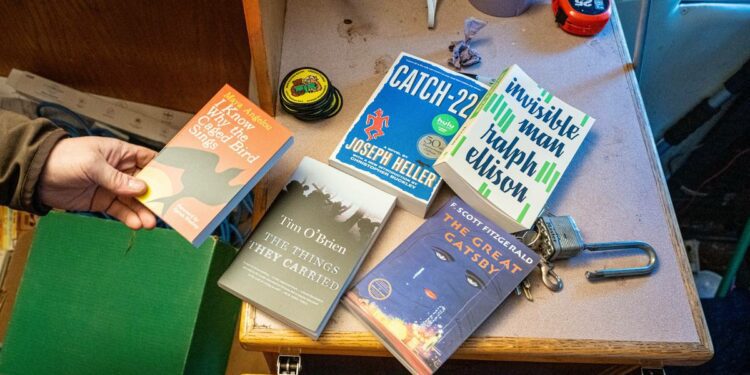Alaska Bookmobile founder Jimmy Riordan displays banned books inside the Alaska Bookmobile on Oct. 3, 2023 in Spenard. (Loren Holmes / ADN archive)
This is part of Alaska Authors, an occasional series about authors and other literary figures with ties to the 49th state.
For some time, Anchorage author Lynn Lovegreen watched the growing movement across the country to remove books from library shelves, especially in schools, with a growing sense of alarm.
ﻗAs a retired secondary teacher, I have seen how important books are to teens,ﻗ Lovegreen said. ﻗAnd as an author, I have been aware of whatﻗs happening with book challenges and book bans throughout the country, including here in Alaska. I want to stand up for the freedom to read.ﻗ
![]()
Lovegreen, who pens young adult historical romance books, said she had been looking to add her voice to those resisting this trend. Then one day early this year, she saw a social media post from Authors Against Book Bans and was intrigued. ﻗI clicked on the link and looked at their website and wanted to support their cause. So I joined and Iﻗm in the process of helping the Alaska chapter get involved in different activities.ﻗ
Before she knew it, Lovegreen had become the Alaska chapter leader of an organization that has quickly built a nationwide presence.
Authors Against Book Bans, or AABB, was established in January of this year to join the growing pushback by parents, educators, librarians and various organizations seeking to prevent what members feel is a dangerous drift toward reducing the number and diversity of books available on library shelves.
Sarah MacLean, a nationally known author who also writes young adult romance fiction, was present at the organizationﻗs founding and serves on its board of directors. She said that while the groupﻗs name singles out authors, members come from a wide range of those involved in creating and publishing books for both children and adults.
ﻗItﻗs authors and illustrators and audiobook narrators and translators, anthology editors. Itﻗs just too long for the URL to put them all in,ﻗ MacLean said. ﻗI think most authors understand the importance of standing against book bans.ﻗ
![]()
So far, MacLean said, much of the resistance to book banning has been a case of what she called ﻗwhack-a-mole,ﻗ opposing individual bans when they happen instead of being proactive. With an increasing number of organizations getting involved, however, Authors Against Book Bans seeks to work in tandem with such allies as the ACLU, PEN America and the American Library Association, as well as regional and state-level library associations, local and school libraries, and more.
The group was founded on the idea that all of these entities, from national organizations to schools on the front lines, have unique roles to play, and that by coming together as a united front, they can be more effective in their efforts than each would be by acting alone. Authors Against Book Bans, MacLean said, offers an important perspective. ﻗWe were built as the author wing of the fight against book bans.ﻗ
To that end, Lovegreen said, Authors Against Book Bans works on requests from schools and other institutions. ﻗRather than spend a lot of time doing things that may not be helpful, we ask what is helpful, and we try to act accordingly.ﻗ
Cordova author Cathy Pegau said that when she learned of the group, she immediately wanted to be part of it. While her science fiction romance, paranormal romance, and cozy historical mystery books are aimed at adults, she feels itﻗs only a matter of time until attention is shifted to work like hers.
![]()
ﻗI have queer characters. That seems to be a thing that folks who are banning books are looking at. Not even the fact that theyﻗre having any kind of physical sexual relationship, just the fact that there are queer characters in a book is getting folks all up in arms,ﻗ she said. ﻗIﻗm looking at the writing on the wall.ﻗ
When Lovegreen launched the Alaska chapter of Authors Against Book Bans, she sent emails to authors throughout the state urging them to join. Receiving one of those emails brought Pegau on board. ﻗI know that itﻗs not a matter of if something is going to go on here in the state, itﻗs when,ﻗ she said, noting itﻗs already happening with the ongoing library books dispute in the Matanuska-Susitna Borough School District.
[Itﻗs Banned Books Week. LGBTQ+ content tops the most-challenged list.]
Lovegreen pointed out that many of the book challenges target specific minorities in America whose voices have long been underrepresented in both childrenﻗs and adult literature.
ﻗNowadays we live in a very diverse world with more books written by LGBTQ+ and BIPOC authors who write stories they wish they had had when they were younger,ﻗ she said. ﻗAnd kids want to see themselves reflected in books. So when we ban a book based on a particular identity, then weﻗre telling those people that their life and their stories are not worthy of discussions. And thatﻗs not fair.ﻗ
Pegau echoed this statement, emphasizing that efforts to remove books from shelves are too frequently directed at works by Americans from minority communities, and that just because certain books make some people uncomfortable doesnﻗt mean they should be banned.
ﻗI cannot see how this is a good thing,ﻗ she said. ﻗYou donﻗt want your grandchildren or children to read those books? Fine. But my kid or other kids, if they get a chance to see that there are books about and for them, let them have that moment of, ﻗHey, itﻗs not just me. I can be seen.ﻗﻗ
Lovegreen, who shares this belief, said that ﻗkids should have the right to see themselves reflected in books and read books that are interesting to them.ﻗ
Authors Against Book Bans focuses on supporting the rights of young people to read, and others who are impacted by book bans, including teachers and librarians, Lovegreen said. The work the Alaska chapter plans on doing includes speaking at public meetings, writing opinion pieces and supporting children caught in the middle.
Reflecting on recent actions taken in Mat-Su, and the likelihood that such activity will soon spread to other districts, Pegau said that the Alaska chapter will be speaking up. ﻗWhen challenges are put out there, Iﻗd like to see us put out some kind of statement, put up some kind of pushback about why this is wrong. Whatever the book is thatﻗs being banned and wherever itﻗs being challenged,ﻗ she said. She added that the group might also engage by ﻗshowing up at a library or wherever somebody is being harassed about books.ﻗ
MacLean suggests that even non-writers can join the resistance to book bans by calling federal representatives, state legislators, local assembly persons and school board members. Attend school board meetings, she said, or consider running for a school board seat. And most importantly, talk with and support librarians and educators. ﻗSaying thank you goes a long way,ﻗ she said.
Discussing the Alaska chapterﻗs objectives, Lovegreen concluded, ﻗMy vision is for people to know about Authors Against Book Bans in Alaska, and for us to partner with people who would like extra support or would like to hear what authors feel about the issue. And hopefully, while weﻗre doing that, weﻗll be able to provide a framework for organizing and supporting freedom to read around the state. The right to read is an important part of American democracy, and books should be accessible to people who want to read them.ﻗ
Source link : http://www.bing.com/news/apiclick.aspx?ref=FexRss&aid=&tid=66f4f6aa4fb64d849f312b1139a79f60&url=https%3A%2F%2Fwww.adn.com%2Farts%2Fbooks%2F2024%2F09%2F25%2Falaska-authors-join-fight-against-banned-books-with-local-chapter-of-fledgling-national-group%2F&c=2688200670841188073&mkt=en-us
Author :
Publish date : 2024-09-25 11:49:00
Copyright for syndicated content belongs to the linked Source.











